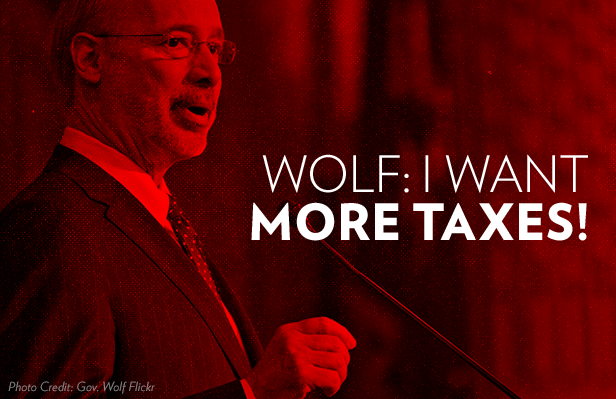Media

The Unrelenting Demand for Tax Increases Illustrates Lessons Unlearned
For Gov. Wolf, the more things change, the more they stay the same.
Despite the harm caused by last year’s tax increases, Gov. Wolf appears to be holding out—yet again—for more tax hikes. The governor is convinced that taxing away the income of Pennsylvanians will help solve the state’s fiscal woes. A contingent of Republicans in the General Assembly disagree, which is why lawmakers have yet to agree on a way to pay for a $32 billion state budget.
The PLS Reporter documents the source of the disagreement (paywall):
While it might be too soon to say that the revenue discussions are completely broken, one thing is for certain: a revenue plan presented by Republican leaders to Gov. Wolf that produces $800 million in revenue for the current and coming fiscal years was rejected—at least in part—by the governor Sunday afternoon.
That did not sit well with the Republicans, who presented the agreement after having been locked in internal arguments over how to generate revenue through gaming expansion and potential liquor privatization expansion for several weeks.
In addition to the revenue generators above, Republicans also offered a plan for fund transfers and borrowing more than one billion dollars. While the latter idea should be avoided, it’s important to note that the Republican proposal did not include tax increases. This in contrast to Gov. Wolf, who continues his crusade against his own campaign promise to protect working people from tax hikes. The PLS Reporter has more:
…sources close to the revenue negotiations have said the governor continues to put on the table the concept of a severance tax on natural gas extracts, something the Republican legislative majorities dismissed Sunday as unattainable in their caucuses.
Other revenue concepts include a gross receipts tax on natural gas, increasing the bank shares tax, removing the sales tax exemption for basic cable, and also the closing of other sales tax exemptions laid out by the governor in his February budget address.
The gross receipts tax (a tax on home heating) and the tax on basic cable are broad-based tax increases—something both the governor and legislative leaders ruled out earlier this year. Adopting either would break another promise to the state’s residents.
That doesn’t mean lawmakers should settle for targeted tax hikes. Any tax hike diminishes the income of working people and will do little to address Pennsylvania’s real problem: excessive spending. The Independent Fiscal Office projects state revenue to grow by an average of 3.5 percent over the next five years. But General Fund spending growth will be even higher—at an average of 4.25 percent.
If lawmakers try to raise taxes to fix this long-term spending problem, they’ll further hamper the commonwealth’s stagnant economy and plunge the state further into a financial sinkhole. Connecticut has traveled down this tax hike path before, but now officials are turning back because no state can tax its way to prosperity and fiscal stability simultaneously.
Forcing families to make budget cuts via taxes is not the solution. Viable alternatives exist, including liquor privatization, welfare reform, and spending prioritization. Last week, CF released a new analysis on this third option, identifying more than $3 billion in spending found outside the General Fund. Lawmakers could redirect a portion these funds into the General Fund—permanently—to provide stable and recurring revenue.
The choice is simple: Pennsylvania can continue to subsidize special interests and raise your taxes to pay for it, or they can enact real reforms and move toward creating a destination state for people to live and work.